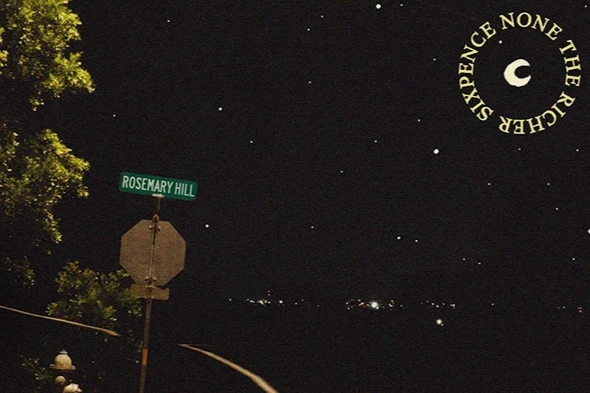Few things could be described as continuities in pop culture since the turn of the century; first things first, it has manifested in the internet. Fashion, movies, celebrities, music and their industries wouldn’t survive without what the internet has created them to be, and they continue to change with new developments every day. All this being said, the voice, poor in technique, unique in timbre, has stuck in our minds for 12 years and five albums now and is unmistakable – You can’t help but remember “Oh yeah, that’s Adam Levine.”
Since 2002, the band Maroon 5 has released four LPs – Songs About Jane, It Won’t Be Soon Before Long, Hands All Over and Overexposed – all of which have harbored chart-topping hits such as (but not limited to) “She Will Be Loved,” “Won’t Go Home Without You,” “Misery” and “Payphone.”
As of Sept. 2, the band has released their 11-track LP, entitled V (the roman numeral for five, because it’s their fifth studio album). Already, radios have been playing pre release singles such as “Maps” and “Animals.”
The longevity band’s major success in the industry is due to their ability to grow and change in sound in like manner to the sound that is defined as pop. Retrospect with me: 10 years ago, the pop sound was dominated by the electric guitar, and with the change of the decade came the revival of a synth lead. Maroon 5 embodies the change in sound, apparent in the stark contrast between Hands All Over and Overexposed. As a whole, V is a continuation of the newer pop sound.
From a business standpoint, M5’s success is usually something to be envied; in the industry, a band is fortunate to have two or three successful albums and a five year career. However, from an artistic standpoint, fault is found in that; at some point, a band’s songwriting can (and often does) become written for a target audience more so than to express an idea or theme in a new way. V is littered with songs that sound as if they’re written solely for radio play as opposed to creative expression: “New Love,” “It Was Always You,” “In Your Pocket,” and “Sugar” are the worst offenders.
Another symptom of holding onto fame that the band has experienced is the loss of a style that was theirs and theirs alone in the pop genre. Since the transition from guitar to synth, Levine and other songwriters that have accompanied him along the way gave up on lead guitar riffs that were heavily influenced by jazz and principles of it integral for creating songs like “Harder to Breathe,” “This Love,” and “Misery” – all of which have been major hits while also standing out from typical pop progressions.
While, for the most part, V seems to be a demonstration of M5’s desire to appease the crowd and the ever-changing idea of what is popular, there are a few songs that embody what I would consider classic Maroon 5. Levine has an aptitude for writing songs that explain the modern idea of relationships, finding the perfect balance between hopeful and cynical. “Unkiss Me” and “Coming Back For You” are the two best additions to his repertoire from V that also do a better job of blending the 2000’s style with today’s sound.
Co-written with Nate Ruess, leader singer of Fun., “Leaving California” is the one song that is a necessity to hear on the album. While it’s not as much like the original Maroon 5 sound, one of its best assets is simplicity; it stands out because it builds dynamically and marches steadily in tempo (the norm for this album is loud, fast, and thumping.) Lyrically, it inspires hope for love, but from a musical standpoint, it’s proof that the new Maroon 5 sound does not mark the end of an era. Bands change: that’s a part of keeping up with the music industry. Although V as a whole seemed to be executed with radio airtime in mind more so than developing themes and sounds, Maroon 5 demonstrated a capability for thoughtful and successful music making in another decade and sound, which gives me hope for a new kind of classic sixth album.
Parkway West Pathfinder gives V a 5.7/10.




![There are more than 20 open cardio machines at Crunch Fitness. I enjoyed the spacious environment at Crunch, a sentiment that was shared by sophomore Sanjana Daggubati. “[Going to] Crunch Fitness was the right decision because [it] feels more professional. Crunch’s workers are laid back, but not to the point where they don't care,” Daggubati said.](https://pwestpathfinder.com/wp-content/uploads/2025/09/IMG_5242-1-1200x900.jpg)

![Various empty Kit Kat wrappers crowd the desk, surrounded by scoring sheets. While production of Kit Kat flavors in the U.S. is limited, Nestlé, the owner of Kit Kat, manufactures hundreds of unique flavors in Japan, including the flavors ocean salt and passion fruit. “I thought there [were] some interesting flavors, and a lot of them were really unexpected,” senior Elle Levesque said.](https://pwestpathfinder.com/wp-content/uploads/2025/09/image-2.png)


![Pantone’s selection of the 2025 Color of the Year is revealed: Mocha Mousse. Ceramics teacher Ashley Drissell enjoys this year’s selection. “Maybe it’s the name but [Mocha Mousse] reminds me of chocolate and coffee. It makes me hungry. It’s very rich and decadent,” Drissell said.](https://pwestpathfinder.com/wp-content/uploads/2025/02/DSC_0015-1200x800.jpg)


